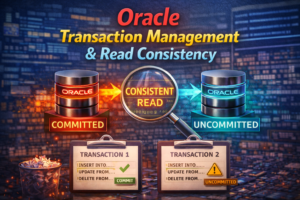Should You Use “@” in Oracle Passwords? Risks, Errors & Fixes
Learn why @ in Oracle passwords breaks logins with ORA/SP2 errors and listener issues, plus fixes and best practices.
When setting strong passwords in Oracle, it’s tempting to use special characters like @. But in Oracle’s world, @ isn’t just another symbol—it has a special meaning. If you’re not careful, using @ in passwords can lead to confusing errors and broken scripts. Let’s explore why this happens, the exact Oracle errors you may see, and how to fix them.
Why “@” Causes Trouble in Oracle
In Oracle SQL*Plus and many client tools, @ is reserved for:
- Connecting to a remote database (
sqlplus user/pass@db) - Running external scripts (
@script.sql)
So when you put @ inside a password, Oracle often misinterprets it as part of a connection string or a script reference, not the password itself.
Common Errors You May See with “@” in Passwords
Here are real-world errors Oracle users often encounter:
- ORA-12154: TNS:could not resolve the connect identifier specified
- Triggered when Oracle mistakes the part after
@as a database alias. - Example:
sqlplus user/p@ssword@ORCLOracle thinkssswordis the connect identifier.
- Triggered when Oracle mistakes the part after
- ORA-01017: invalid username/password; logon denied
- Raised when the client truncates or misreads the password because of
@.
- Raised when the client truncates or misreads the password because of
- SP2-0306: Invalid option. Usage: CONN[ECT] [logon]
- SQL*Plus fails to parse the connection string correctly.
- SP2-0310: Unable to open file “ssword.sql”
- Happens when Oracle assumes
@sswordis a script filename.
- Happens when Oracle assumes
- ORA-12514: TNS:listener does not currently know of service requested in connect descriptor
- Occurs when the password confuses the client into sending a malformed connect descriptor to the listener.
- ORA-12541: TNS:no listener
- Another listener-related error if the connect string breaks completely.
These errors can appear unpredictable—sometimes login works, sometimes you’ll see baffling ORA or SP2 messages.
How to Avoid or Fix These Issues
1. Quote the password properly
sqlplus user/"p@ssword"@ORCL2. Use /nolog first
sqlplus /nolog
CONNECT user/"p@ssword"@ORCL3. Escape or encode in JDBC URLs
jdbc:oracle:thin:user/p%40ssword@//host:1521/ORCL4. Use Oracle Wallet or OS authentication
Store credentials securely instead of hardcoding them with special characters.
5. Test across tools
A password that works in SQLPlus may still fail in JDBC, RMAN, or SQLLoader unless handled properly.
Error → Cause → Fix (with Examples)
| Error | Why It Happens | Fix (with Syntax Example) |
|---|---|---|
ORA-12154TNS:could not resolve the connect identifier specified | @ splits the connect identifier incorrectly | Quote the password:sqlplus user/"p@ssword"@ORCL |
ORA-01017invalid username/password; logon denied | Password truncated or misread | Use /nolog then connect:sqlplus /nologCONNECT user/"p@ssword"@ORCL |
SP2-0306Invalid option. Usage: CONN[ECT] [logon] | SQL*Plus fails to parse the connect string | Quote password properly:sqlplus user/"p@ssword"@ORCL |
SP2-0310Unable to open file "ssword.sql" | Oracle treats @ssword as script filename | Quote password:sqlplus user/"p@ssword"@ORCL |
ORA-12514TNS:listener does not currently know of service requested | Malformed connect descriptor sent to listener | Encode @ in JDBC:jdbc:oracle:thin:user/p%40ssword@//host:1521/ORCL |
ORA-12541TNS:no listener | Client sends broken connect string | Use wallet or proper quoting:sqlplus user/"p@ssword"@ORCL |
Recommended Password Policy for Oracle
If you want strong yet compatible Oracle passwords, here are some best practices:
- 🔒 Minimum length: At least 12–14 characters
- 🔑 Character mix: Use uppercase, lowercase, numbers, and symbols
- 🚫 Avoid reserved symbols: Don’t use
@,/,:(they often clash with Oracle syntax) - ✅ Safer symbols: Use
#,$,%,!,^,*,_,+— these don’t interfere with connection strings - 🔁 Rotation: Change passwords every 90 days (or follow your org’s policy)
- 🛡️ Secure storage: Prefer Oracle Wallet, OS-based authentication, or secret managers instead of hardcoding passwords in scripts
Should You Use “@” in Oracle Passwords?
- Yes, if you’re confident with quoting/escaping and/or using Oracle Wallet.
- No, if your environment relies on multiple scripts and tools—
@adds complexity and breaks automation.
Best practice: Use other strong symbols (#, $, %, !, ^) that don’t conflict with Oracle’s reserved operators.
Takeaway: While Oracle technically allows @ in passwords, it often leads to errors like ORA-12154, ORA-01017, SP2-0310, or listener failures like ORA-12514. Unless you’re prepared to carefully handle quoting and escaping, it’s safer to avoid @ in Oracle passwords and stick to symbols that won’t clash with Oracle’s connection syntax.


